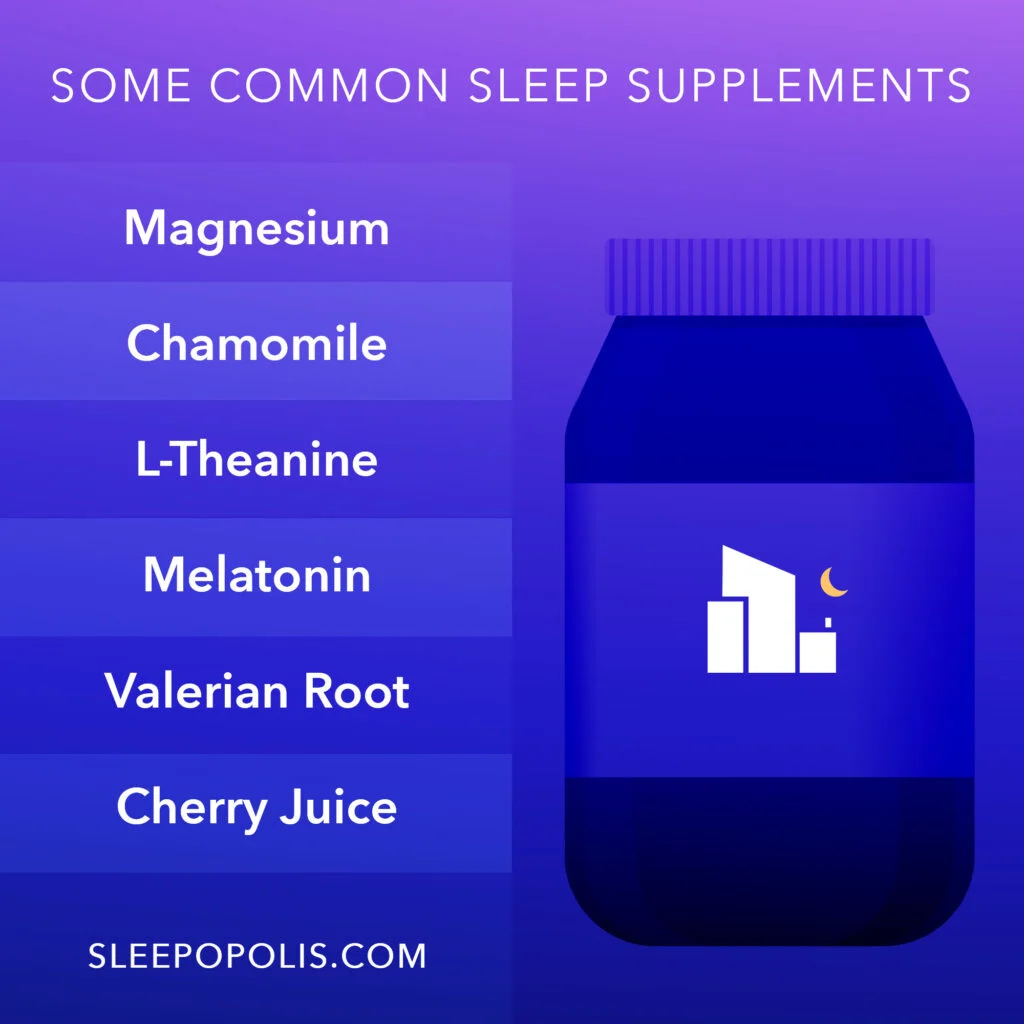
We often feel bound to busy schedules and devices, which demand much of our time and energy. And often one of the first things to fall by the wayside when we’re under pressure is our ability to rest well. This has many people turning to natural sleep aids as a holistic solution. In an exclusive Sleepopolis survey of over 1,000 American adults, 81 percent of people said they’ve tried a natural sleep aid or dietary supplement to help improve their sleep.
Magnesium, tart cherry, and chamomile seem to offer a promising avenue for those seeking better rest. But do they work? We’re taking a closer look at what science says about some of the most popular natural sleep aids, including the pros and cons to consider.
Note: The content on Sleepopolis is meant to be informative in nature, but it shouldn’t be taken as medical advice, and it shouldn’t take the place of medical advice and supervision from a trained professional. If you feel you may be suffering from any sleep disorder or medical condition, please see your healthcare provider immediately. Additionally, restrictions and regulations on supplements may vary by location. If you ever have any questions or concerns about a product you’re using, contact your doctor.
Long Story Short
- Several herbs, minerals, and supplements are considered natural sleep aids and may be used in place of conventional pharmaceuticals.
- Many people have found magnesium, L-theanine, chamomile, tart cherry, valerian root, and melatonin helpful for promoting calmness in preparation for sleep as well as improving sleep quality.
- Scientific evidence for most natural sleep supplements is limited and mixed, and the effects vary between people. Speak with your healthcare provider before adding one to your routine.
Magnesium
Magnesium supplements have recently skyrocketed in popularity, with approximately 1 in 4 Americans having tried the supplement to help them sleep, according to our survey.
Magnesium, an essential mineral involved in over 300 enzymatic processes in the body, may also be a promising natural sleep aid. Its ability to regulate neurotransmitters like GABA contributes to its anti-anxiety effects, promoting relaxation. (1)
What Is GABA?
Gamma-aminobutyric acid (GABA) is a chemical in your brain that plays an important role in helping you relax. Magnesium helps GABA properly attach to its receptors in your brain so it can do this job.
Animal studies have found that magnesium deficiency may also promote low levels of melatonin, a hormone that regulates your sleep-wake cycle. While these studies didn’t extend to humans, we can speculate that not getting enough magnesium could negatively influence sleep quality. (2)
Though research at this point is limited, there are some human studies we can turn to. A 2021 meta-analysis found evidence that older adults with insomnia symptoms can experience benefits from taking less than 1 gram of magnesium up to three times per day. Still, the overall research on magnesium for improving sleep quality is limited and mixed. (3) (4)
Sports performance and wellness dietitian Umo Callins, MS, RD, CSSD, LD, CPT says, “Including a variety of [magnesium-rich] foods in your regular diet will help with achieving adequate levels and avoiding deficiency. It’s ideal to try to increase your intake of magnesium through your diet first before supplementing it.”
Bottom line: Whether obtained through dietary sources or as a modest supplement, incorporating magnesium into your bedtime routine may be helpful. Find magnesium in foods like dark chocolate, legumes, nuts, bananas, and avocados. (5)
Chamomile
We all know someone (or perhaps it’s you!) who swears by a hot cup of chamomile tea to help them relax at the end of a long day. In fact, 1 in 4 Americans reported using chamomile to help improve their sleep in Sleepopolis’ survey.
Chamomile, a delicate and aromatic herb, is one of nature’s most renowned remedies for promoting restful sleep. It has a long history of therapeutic use and is widely recognized for its calming properties. (6)
Chamomile is known for having anti-inflammatory, antioxidant, pain-relieving, and antimicrobial effects. A compound in chamomile called apigenin binds to areas in your brain and helps make some people tired. (6) Anecdotally, chamomile is pretty popular for people looking to get a good night’s sleep, too.
Still, there are a limited number of controlled trials looking at chamomile and sleep. The most recent research has found that chamomile is beneficial and safe when used for improving overall sleep quality and targeting generalized anxiety disorder, but more data is needed to draw any firm conclusions. (7) (8)
Bottom line: Whether enjoyed as a bedtime tea or infused into essential oils for aromatherapy, chamomile offers a gentle and non-habit-forming solution to those seeking a peaceful night’s sleep. According to Sheri Berger, RDN, CDCES, a registered dietitian and nutrition consultant, drinking two cups of chamomile tea per day can be a good place to start. (9)
L-Theanine

L-theanine is an amino acid found primarily in green, black, or oolong tea leaves that many people find useful for inducing relaxation. It’s also known for its anti-anxiety effects, which can help improve sleep quality. (10) Though use of this supplement was reported by only 8 percent of people in our survey, L-theanine is gradually increasing in popularity.
L-theanine works by increasing the production of neurotransmitters such as serotonin and dopamine, fostering a sense of tranquility and reducing stress levels. As a natural sleep aid, it not only promotes a peaceful mindset but may also help reduce the time it takes to fall asleep. (11)
A 2019 randomized, placebo-controlled, crossover, and double-blind study found that 200 mg of L-theanine per day given to 30 stressed but otherwise healthy adults was effective for improving sleep. Berger notes that L-theanine is most effective for improving sleep when taken 30-60 minutes before bed. (10)
Bottom line: L-theanine has demonstrated potential by promoting relaxation and reducing anxiety and stress; however, further research is required to establish its overall efficacy, as these studies have several limitations. Consider adding green, black, or oolong tea to your bedtime routine.
Melatonin
Sleepopolis’ survey found that over half of respondents had taken melatonin in the past month, with 28 percent taking this sleep aid three or more days per week. Additionally, a whopping 71 percent of survey respondents had tried melatonin at some point in time.
Possibly one of the heaviest hitters in the sleep aid category, melatonin is a hormone secreted in an area of your brain called the pineal gland. It’s heavily involved in the regulation of your circadian rhythm (AKA your sleep-wake cycle), with levels increasing at the end of the day and decreasing in the light of the morning. (12)
Certain foods, like pistachios, grapes, and mushrooms, contain small amounts of melatonin, but not in quantities large enough to have a noticeable effect on your sleep. (13) A more concentrated source would be supplemental melatonin — but note that this is manmade and not a natural sleep aid.
Research suggests that short-term use of melatonin, in doses of up to 10 mg per day — though most experts will recommend you start with smaller amounts, like 1 mg — can be helpful for adults struggling to get their sleep cycle back on track due to jet lag, night shift work, or stress. However, data on the safety of long-term usage safety and efficacy is limited. (12)
According to Charlsie Myers, PhD and Certified Sleep Consultant, “The key for melatonin to work effectively is to take the supplement around 1-2 hours before you need to fall asleep so it works like your naturally-produced melatonin would, which then helps prepare the body and brain for sleep (as long as you then begin your bedtime routine and turn off sources of light).”
It’s also important to understand that the FDA does not regulate supplements the same way they regulate prescriptions and over-the-counter drugs, and some melatonin supplements have been found to have much more melatonin than advertised—and sometimes even additional ingredients, like CBD. If you’re thinking about using this supplement, be sure to talk with your healthcare provider and do your own research as you pick a brand.
Bottom line: Melatonin supplements are not natural sleep aids, but many people find them useful in the short term to rebalance their sleep-wake cycle. Just remember that long-term safety data is limited.
Valerian Root
Valerian root is an herbal remedy known for its soothing properties. While just 1 in 10 people in our survey reported trying the supplement, it has a few noteworthy benefits that we’ll dive into. Valerian root is believed to interact with GABA receptors in the brain, promoting a calming effect on the central nervous system.
Valerian root can be consumed in various forms, including herbal teas, tinctures, or capsules. Many people swear by its ability to induce relaxation and facilitate a more restful night’s sleep without the grogginess associated with some pharmaceutical sleep aids.
However, Berger notes that a 2020 review and meta-analysis of 60 studies found inconsistent results with valerian as a sleep aid. While some studies are promising, there is a wide variation in the quality of herbal extracts out there. The authors suggested further research and standardization of quality controls. (14)
Bottom line: High-quality valerian root has shown promise as a natural sleep aid, with some studies suggesting its potential to improve sleep quality, but more research is needed to conclusively determine its effectiveness.
Cherry Juice
Tart cherry juice is a naturally rich source of melatonin. Some studies suggest that regularly consuming it may not only increase melatonin levels but also improve overall sleep duration and quality. (15)
Studies suggest that consuming more melatonin-rich foods each day, like tart cherry juice, is associated with more restful sleep and improved mood. Some researchers think this is due to how tart cherry juice reduces inflammation and increases the availability of tryptophan (an amino acid needed to make serotonin and melatonin for sleep regulation — yes, the one found in turkey!) (16)
Interestingly, in a 2023 review and meta-analysis of 8 studies, researchers found a significant improvement in the efficiency and quantity of sleep among people who used tart cherry juice — even if they didn’t subjectively report feeling the effects. (15)
On the other hand, a 2022 study found no improvement in sleep time or quality when participants drank two 240 mL bottles of tart cherry juice per day. (17) This study only included 44 people and seems to conflict with a larger body of work that supports cherry juice as a sleep aid, but it could mean more research is needed before any firm conclusions are drawn.
If you want to give the tart cherry juice sleep aid a try, how much should you take? “Eight ounces of tart cherry juice (look for 100 percent juice, not a cocktail, to minimize sugar content) or 480 mg of tart cherry extract capsules is the recommended dose. Plan to take your tart cherry in the evening to help with sleep,” says Katie Breazeale, MS, RD, LD.
Bottom line: Although research is mixed, tart cherry juice can be a tasty way to help increase melatonin levels in preparation for sleep. Just be sure to avoid high-added sugar cocktails.
The Pros and Cons of Natural Sleep Supplements
We’ve had our fair share of sleepless nights, and we know it can be tempting to try any solution when you’re having trouble sleeping. The use of natural sleep aids comes with advantages and downsides that are important to consider before adding one to your routine.
Pros
If you’re interested in trying a natural sleep aid, the good news is that there are plenty to choose from. Natural sleep aids generally provide a gentler and non-habit-forming approach when compared to pharmaceutical alternatives. (18)
They are also typically associated with fewer side effects — though this can vary between people — making them a favorable option for individuals who may be sensitive to traditional sleep medications.
Cons
The effectiveness of natural sleep aids can vary from person to person, and in most cases they likely won’t lead to an instant, overnight fix. A noteworthy 23 percent of Sleepopolis survey respondents indicated that they stopped taking their natural sleep aids or supplements because they didn’t feel like they helped.
Additionally, scientific evidence supporting their efficacy may not be as robust as that for pharmaceutical options. Berger says, “Since there is not a lot of scientific research done on natural sleep aids, most do not have a safe dosage recommendation.”
Furthermore, herbs and supplements are not regulated by the FDA like pharmaceuticals, which means their quality, safety, and purity may be questionable. Look for products that bear a third-party seal, such as one from NSF International, USP, or ConsumerLab, indicating they have been independently tested. (19)
FAQs
What is the best natural sleep aid?
The best natural sleep aid is one that works well for you and has minimal to no negative side effects when used as directed. Because individual responses to natural sleep aids can vary, it may take some trial and error, and consultation with a health professional, to determine your best option — especially if you have underlying conditions or are taking medications.
Are natural sleep aids safe?
In general, many natural sleep aids are considered safe when used as directed and in moderation. Consult with a healthcare professional before incorporating any into your routine. Keep in mind that herbs and supplements are not regulated by the FDA like pharmaceuticals, which means their quality, safety, and purity may be questionable. Look for products that bear a third-party seal, such as one from NSF International, USP, or ConsumerLab, indicating they have been independently tested. (19)
The Last Word From Sleepopolis
Natural sleep aids like chamomile and magnesium, as well as supplements like melatonin, are widely used by people seeking holistic alternatives to conventional medications. While natural remedies have potential, the scientific evidence behind them is mixed, and individual responses may vary. Speak with your healthcare provider before incorporating a natural sleep aid into your routine to make sure it’s safe for you.
Sources
- Pickering G, Mazur A, Trousselard M, et al. Magnesium Status and Stress: The Vicious Circle Concept Revisited. Nutrients. 2020;12(12):3672. Published 2020 Nov 28. doi:10.3390/nu12123672
- Zhang Y, Chen C, Lu L, et al. Association of magnesium intake with sleep duration and sleep quality: findings from the CARDIA study. Sleep. 2022;45(4):zsab276. doi:10.1093/sleep/zsab276
- Mah J, Pitre T. Oral magnesium supplementation for insomnia in older adults: a Systematic Review & Meta-Analysis. BMC Complement Med Ther. 2021;21(1):125. Published 2021 Apr 17. doi:10.1186/s12906-021-03297-z
- Arab A, Rafie N, Amani R, Shirani F. The Role of Magnesium in Sleep Health: a Systematic Review of Available Literature. Biol Trace Elem Res. 2023;201(1):121-128. doi:10.1007/s12011-022-03162-1
- Magnesium Fact Sheet for Consumers. NIH Office of Dietary Supplements. Updated 22 March 2021. Available: https://ods.od.nih.gov/factsheets/Magnesium-Consumer/
- Sah A, Naseef PP, Kuruniyan MS, Jain GK, Zakir F, Aggarwal G. A Comprehensive Study of Therapeutic Applications of Chamomile. Pharmaceuticals (Basel). 2022;15(10):1284. Published 2022 Oct 19. doi:10.3390/ph15101284
- Hieu TH, Dibas M, Surya Dila KA, et al. Therapeutic efficacy and safety of chamomile for state anxiety, generalized anxiety disorder, insomnia, and sleep quality: A systematic review and meta-analysis of randomized trials and quasi-randomized trials. Phytother Res. 2019;33(6):1604-1615. doi:10.1002/ptr.6349
- Guadagna S, Barattini DF, Rosu S, Ferini-Strambi L. Plant Extracts for Sleep Disturbances: A Systematic Review. Evid Based Complement Alternat Med. 2020;2020:3792390. Published 2020 Apr 21. doi:10.1155/2020/3792390
- El Mihyaoui A, Esteves da Silva JCG, Charfi S, Candela Castillo ME, Lamarti A, Arnao MB. Chamomile (Matricaria chamomilla L.): A Review of Ethnomedicinal Use, Phytochemistry and Pharmacological Uses. Life (Basel). 2022;12(4):479. Published 2022 Mar 25. doi:10.3390/life12040479
- Hidese S, Ogawa S, Ota M, et al. Effects of L-Theanine Administration on Stress-Related Symptoms and Cognitive Functions in Healthy Adults: A Randomized Controlled Trial. Nutrients. 2019;11(10):2362. Published 2019 Oct 3. doi:10.3390/nu11102362
- Kim S, Jo K, Hong KB, Han SH, Suh HJ. GABA and l-theanine mixture decreases sleep latency and improves NREM sleep. Pharm Biol. 2019;57(1):65-73. doi:10.1080/13880209.2018.1557698
- Savage RA, Zafar N, Yohannan S, et al. Melatonin. [Updated 2022 Aug 8]. In: StatPearls [Internet]. Treasure Island (FL): StatPearls Publishing; 2023 Jan-. Available from: https://www.ncbi.nlm.nih.gov/books/NBK534823/
- Kennaway DJ . Melatonin rich foods in our diet: food for thought or wishful thinking?. Food Funct. 2020;11(11):9359-9369. doi:10.1039/d0fo02563a
- Shinjyo N, Waddell G, Green J. Valerian Root in Treating Sleep Problems and Associated Disorders-A Systematic Review and Meta-Analysis. J Evid Based Integr Med. 2020;25:2515690X20967323. doi:10.1177/2515690X20967323
- Stretton, B., Eranki, A., Kovoor, J. et al. Too Sour to be True? Tart Cherries (Prunus cerasus) and Sleep: a Systematic Review and Meta-analysis. Curr Sleep Medicine Rep 9, 225–233 (2023). https://doi.org/10.1007/s40675-023-00261-w
- Borisenkov MF, Popov SV, Smirnov VV, et al. The Association between Melatonin-Containing Foods Consumption and Students’ Sleep-Wake Rhythm, Psychoemotional, and Anthropometric Characteristics: A Semi-Quantitative Analysis and Hypothetical Application. Nutrients. 2023;15(15):3302. Published 2023 Jul 25. doi:10.3390/nu15153302
- Hillman AR, Trickett O, Brodsky C, Chrismas B. Montmorency tart cherry supplementation does not impact sleep, body composition, cellular health, or blood pressure in healthy adults. Nutr Health. Published online July 5, 2022. doi:10.1177/02601060221111230
- Guadagna S, Barattini DF, Rosu S, Ferini-Strambi L. Plant Extracts for Sleep Disturbances: A Systematic Review. Evid Based Complement Alternat Med. 2020;2020:3792390. Published 2020 Apr 21. doi:10.1155/2020/3792390
- FDA 101: Dietary Supplements. FDA.gov. Published 2 June 2022. Available: https://www.fda.gov/consumers/consumer-updates/fda-101-dietary-supplements
Berger, Sheri. Personal interview. December 15, 2023.
Breazeale, Katie. Personal interview. December 17, 2023.
Callins, Umo. Personal interview. December 17, 2023.
Myers, Charlsie. Personal interview. December 15, 2023.


























